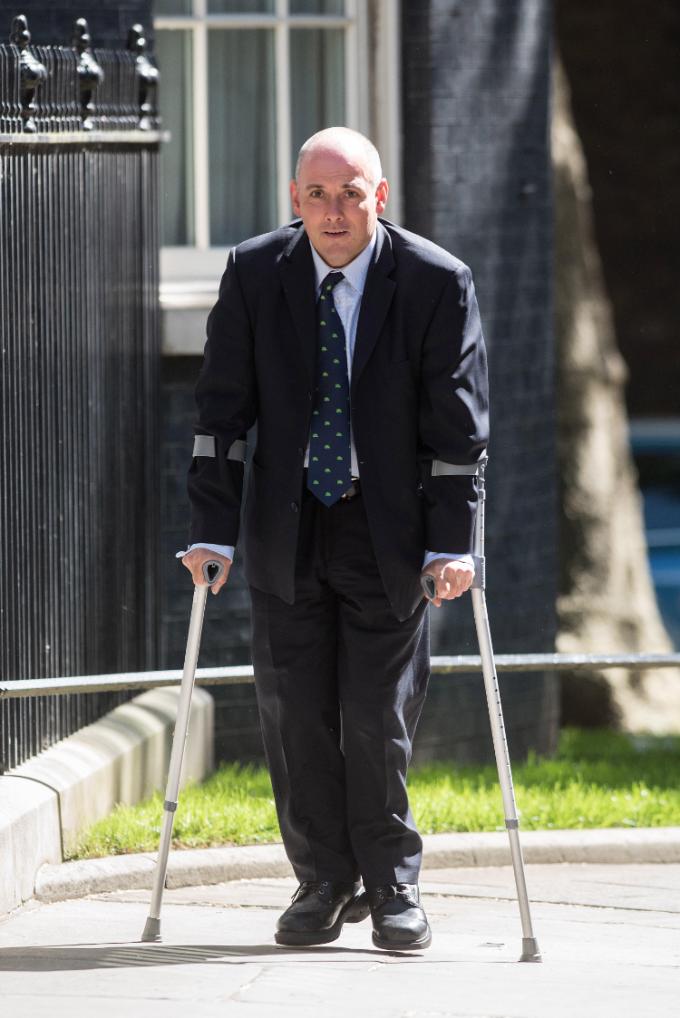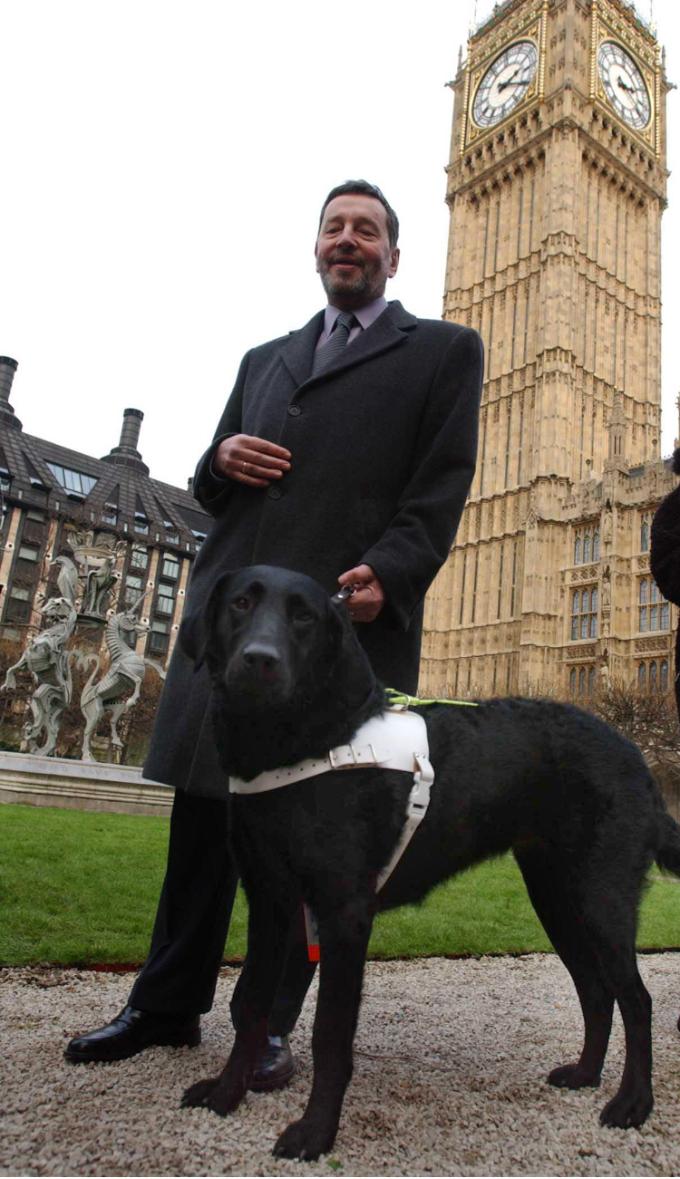Access All Areas? Disabled parliamentarians say Westminster is locking people out of democracy
Only 12 per cent of the Palace of Westminster is wheelchair accessible | Alamy
9 min read
From the buildings of Parliament to outright discrimination, disabled parliamentarians and staffers face physical and societal barriers to accessing politics, resulting in chronic under-representation. Georgina Bailey reports
"Parliament is probably the worst place in the world to [work] if you have a disability,” says Conservative MP Robert Halfon. Halfon, who has cerebral palsy, is one of seven million working-age people in the UK (roughly 18 per cent of the population) who are disabled.
Halfon is not the norm – just half of disabled people are in employment, and Parliament itself has recognised the under-representation of disabled people in politics. If 18 per cent of parliamentarians had disabilities, that would equate to 117 MPs and 138 peers; in reality, there are fewer than 10 current MPs who have publicly disclosed that they are disabled.
Every disability is different and the experiences of disabled people in politics vary accordingly. Former Paralympian Baroness Grey-Thompson says Parliament is “a dream” when compared to her working life before Westminster, although challenges remain. There are also different employment models across the estate, with all parliamentary authorities achieving the top ranking “leader” status in the Disability Confident employer scheme, but only a quarter of MPs even signed up to it.
Disabled people face barriers getting to Parliament in the first place. In a recent report, the Disability Policy Centre found that 82 per cent of disabled activists and elected politicians said they had faced discrimination from within their local or national party. Although parties have their own schemes for disabled candidates, the reality can vary between constituency parties and associations – and central government funding, which used to exist to provide financial support for disabled candidates for the additional costs of campaigning, has been discontinued.
Then there is the parliamentary estate, where disabled MPs, peers and staff say there is a culture of expecting the disabled person to adapt, rather than the institution and its traditions adjusting to them.
The Grade-I listed Palace of Westminster covers an area the size of 16 football pitches and has four floors and 65 different levels. However, there is just one lift that meets modern access standards and only 12 per cent of the Palace is accessible to wheelchair users.
In the Chambers, MPs who use wheelchairs can neither speak from the despatch box if they are front benchers, nor sit on the back benches with their colleagues. The House of Lords is slightly more accessible than the Commons, with four designated wheelchair spaces – however, it is still impossible for the six peers who currently use wheelchairs to be in the Chamber at the same time. After moving to virtual and hybrid proceedings during the pandemic, the Commons returned to fully physical sittings last year, whereas the House of Lords was the first legislature in the world to allow Members with a long-term physical disability to participate remotely.
Much of the parliamentary estate is dark, making it difficult for occupants with visual impairments to navigate, and the acoustics are poor for those with hearing impairments. The noise of the constant traffic and protestors along Whitehall and in Parliament Square can be overstimulating for neurodivergent people, with very few quiet spaces.
My job is to be a parliamentary assistant, not to be an access adviser to the House of Commons
Harry, a Labour staffer, uses a motorised wheelchair and joined Parliament on an internship programme designed to get people from under-represented backgrounds into jobs in politics. “I didn’t think it was going to be an access haven. I was realistic about the challenges,” he says. However the scale of the issue when he arrived, and the cultural lack of understanding, shocked him.
On the journey from entering Parliament in Portcullis House to his MP’s office in Norman Shaw South, Harry has to go through four sets of double doors: it took 14 months for these doors to be made automatic. “I literally needed a colleague to accompany me everywhere. Every time I went to the toilet or to get lunch, I needed to be followed… I felt like a burden on the team, even though they were great about it.”
Harry says that although his MP and office manager were brilliant, and advocated for him, the process was emotionally draining. “My job is to be a parliamentary assistant, not to be an access adviser to the House of Commons. I’m really proud of my disability… but I don’t want to talk about it all the time. I had to spend a lot of those first few months explaining very basic things about my disability, and it was quite an isolating experience.”
 Experiences with the parliamentary authorities more broadly are mixed. Halfon (pictured) sings the praises of the doorkeepers who help him daily, and says that the Speaker and House staff “couldn’t be kinder,” providing him with a stand-up scooter to help him move around the estate and going above and beyond to support him. However, Halfon despairs at the systemic issues in the building: repairs to essential infrastructure like lifts is slow and says there are a multitude of little things that would make the lives of disabled people easier.
Experiences with the parliamentary authorities more broadly are mixed. Halfon (pictured) sings the praises of the doorkeepers who help him daily, and says that the Speaker and House staff “couldn’t be kinder,” providing him with a stand-up scooter to help him move around the estate and going above and beyond to support him. However, Halfon despairs at the systemic issues in the building: repairs to essential infrastructure like lifts is slow and says there are a multitude of little things that would make the lives of disabled people easier.
For example, there are only two accessible bathrooms in the Palace itself, and Halfon says these are often used by able-bodied people. The refusal to put up clear signage and leave heavy doors open shows that staff “just don’t care” about accessibility, he adds, and the long days in the Chamber and amount of walking required around the estate have made his health deteriorate over his 12 years in Parliament.
People are genuinely irritated that you want them to go the extra mile in adaptations that would make it possible for you to work more easily
Lord Blunkett, who is blind, first joined Parliament 35 years ago, and says “the presumption [then] was that I should be very glad to be here, and put up with whatever other people were prepared to offer”. The process of securing adjustments was “horrendous,” culminating in “probably the most embarrassing thing, in terms of my disability, in my political life” when his colleagues had to vote in the House to allow the changes required to put him on an equal footing.
While Blunkett says things are better now, he still finds “people are genuinely irritated that you want them to go the extra mile in adaptations that would make it possible for you to work more easily” in Parliament. The computers and other devices used by most people in Parliament have built in accessibility features, and members of both Houses can get financial and practical support to install additional software. But Blunkett says “the IT systems in the Palace of Westminster are appalling, and the lack of anyone available who really does understand sensory disability is quite disappointing, to put it mildly.”
The All-Party Parliamentary Group for Disability reports similar reluctance when trying to book rooms for their meetings, claiming that the parliamentary authorities refuse to make exceptions when it comes to “bumping” them to less accessible rooms.
Olivia Blake, Labour MP for Sheffield Hallam, has ADHD, dyspraxia and dyslexia, as well as underlying health conditions including diabetes. She says that in some ways the job of an MP is very well suited to ADHD – it is a highly stimulating environment, and ADHD means she is tends to think outside the box, is very empathetic and hyper-focuses on issues she is passionate about.
However, there are also challenges: long days in the Chamber and conventions around debate etiquette makes taking regular medication a struggle, and the inconsistent sitting hours and travelling across the country weekly is not disability-friendly. Like Blunkett, Blake has struggled to get the correct IT infrastructure put in place; while people have been helpful when asked, and the 2019 intake report receiving more active support from the authorities, there is an over-reliance on the disabled person advocating for themself, she says.
It is about that visibility, that day-to-day acceptance of people just doing the job with support and with consideration, but not with patronage and sympathy

Then-home secretary David Blunkett introduces his new guide dog Sadie to the media at New Palace Yard, Palace of Westminster in London, 2003
For Blake, Blunkett, Halfon and Harry, boosting the representation and visibility of disabled people in politics is essential, not only to tackle issues with access in politics, but in wider society.
“It is about that visibility, that day-to-day acceptance of people just doing the job with support and with consideration, but not with patronage and sympathy,” Blunkett suggests. However, this is an issue everyone should care about, he says; every MP, not just disabled MPs, represents disabled people. “If people think, whether on councils or in Parliament, that they can leave the issues to those with lived experience, then it narrows it to down to ‘you persuade us’ rather than ‘we’re legislators, we are working on your behalf.’”
A Parliament spokesperson said: “Creating a more inclusive environment for all members of the parliamentary community is a priority for both Houses. Although we are proud of the work we have done to create an accessible working environment, we recognise there are some areas where we still need to go much further.
“In particular, we understand that certain parts of the parliamentary estate, including the Palace of Westminster, are still extremely challenging for disabled people, with respect to both visible and non-visible disabilities, and through various existing programmes of work, we will continue to ensure that further work is done to improve the overall experience for disabled colleagues, visitors and Members alike.
“Since 2019, the Parliamentary Digital Service has been carrying out a major programme of investment and improvement across our website, intranet and digital tools to meet the needs of all users.
“We aim to ensure that all of our colleagues are trained in disability awareness and support, as well as further promoting the workplace adjustment provisions that both Houses provide. For example, the workplace adjustments case manager in the House of Commons as a designated point of contact and the Inclusion Passport tool in the House of Lords.”
